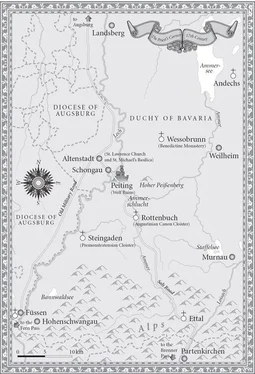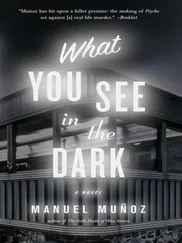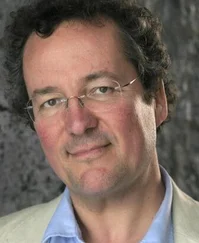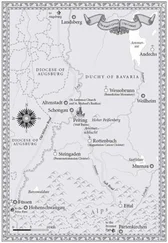Oliver Potzsch - The Dark Monk
Здесь есть возможность читать онлайн «Oliver Potzsch - The Dark Monk» весь текст электронной книги совершенно бесплатно (целиком полную версию без сокращений). В некоторых случаях можно слушать аудио, скачать через торрент в формате fb2 и присутствует краткое содержание. Жанр: Исторический детектив, на английском языке. Описание произведения, (предисловие) а так же отзывы посетителей доступны на портале библиотеки ЛибКат.
- Название:The Dark Monk
- Автор:
- Жанр:
- Год:неизвестен
- ISBN:нет данных
- Рейтинг книги:5 / 5. Голосов: 1
-
Избранное:Добавить в избранное
- Отзывы:
-
Ваша оценка:
- 100
- 1
- 2
- 3
- 4
- 5
The Dark Monk: краткое содержание, описание и аннотация
Предлагаем к чтению аннотацию, описание, краткое содержание или предисловие (зависит от того, что написал сам автор книги «The Dark Monk»). Если вы не нашли необходимую информацию о книге — напишите в комментариях, мы постараемся отыскать её.
The Dark Monk — читать онлайн бесплатно полную книгу (весь текст) целиком
Ниже представлен текст книги, разбитый по страницам. Система сохранения места последней прочитанной страницы, позволяет с удобством читать онлайн бесплатно книгу «The Dark Monk», без необходимости каждый раз заново искать на чём Вы остановились. Поставьте закладку, и сможете в любой момент перейти на страницу, на которой закончили чтение.
Интервал:
Закладка:
“The Templars’ treasure,” Benedikta murmured. “It could have happened that way. Probably only a chosen few even knew that it existed! As the former master of the order in Paris, Wildgraf may have learned about the treasure and was given the assignment of finding a suitable place to hide it. He had already gone into hiding and his pursuers had lost track of him…”
The medicus smiled grimly. “Friedrich Wildgraf certainly went to a lot of trouble to hide his tracks. Only a small memorial plaque at the church in Altenstadt mentions his death.” He nipped on his strong brandy, which tasted of pepper, cloves, and cinnamon, before continuing. “But his grave is actually located under the former Templars’ church, and that’s where Friedrich Wildgraf left his riddle. He chose Christian symbolism to prevent the treasure from falling into the wrong hands. Perhaps the grave was meant to be opened again on a specific date, and if that’s the case, perhaps that was all forgotten-the date came and went unnoticed, with nothing happening. But perhaps, too, the riddle was meant to be solved only on Judgment Day. We’ll never find out…”
Benedikta frowned. “Then, during the restoration work in the church, my brother finds the sealed crypt, opens it, and tells me and the bishop about it,” she said, lost in thought.
Simon started. “The bishop?”
“Didn’t I mention that?” Benedikta gave him a confused look. “My brother wrote in his letter that he would also tell the bishop in Augsburg about it. After all, the bishop was his superior.”
The physician frowned. “Did he send a messenger to the bishop, or did he write?”
“I…I don’t know.”
The wind rattled the windows. Simon gripped the cup of brandy tightly to keep warm.
“Perhaps someone intercepted the messenger and learned about the treasure that way,” he murmured, looking around carefully. “It’s quite possible that someone was watching us when we went to the Altenstadt basilica and to the castle ruins.” He leaned forward and continued in a whisper. “Benedikta, it’s all the more important for that reason that no one learns where we are going now, because the next riddle is something known only to us at present. We have to leave for Wessobrunn without anyone noticing!”
Benedikta smiled at him. “Let me take care of that. Mysterious disappearances are my specialty…along with reading balance sheets…”
Simon laughed, and for a moment his gloomy thoughts receded. But then it occurred to him that he hadn’t thought about Magdalena since the previous day. He sighed, washing his guilty conscience down with brandy that had become lukewarm in the meanwhile. Well, at least she was far from any possible danger she might encounter in Schongau. He grinned. Besides, a Kuisl never had any trouble taking care of him or herself, anyway.
Magdalena ran out into the street just in time to see the stranger taking a left turn. He was swinging the silk purse of poison almost playfully as he strode along the broad main street.
For the first time, the hangman’s daughter got a good look at him. Dressed in a black cloak and a white tunic, he was gaunt and his arms and legs seemed unnaturally long for his body. He was slightly stooped, as if carrying some invisible weight. With his cowl pulled down over his face and his arms swinging, he looked like a busy black bug scuttling for cover. The man was clearly a monk, though Magdalena couldn’t say what order he belonged to. Carefully, she followed.
The only path through the snow was a track just wide enough for two people. Hurrying, he passed bundled-up councillors and maids carrying baskets; once, he gave a shove to a farmer leading a stubborn ox to the butcher’s. The farmer landed in the snow, cursing, alongside the animal. Without paying him any attention, the stranger continued on. Magdalena had trouble keeping up, squeezing her way past grumbling people, forced to step into the knee-high snow to the left or right of the path. Soon her shoes and stockings were drenched. She needed to catch a glimpse of the man’s face, but he was still wearing his cowl and didn’t turn around once.
Deep inside, Magdalena hoped he would never turn around to look at her. That would probably mean certain death for her.
Farther ahead in the market square the path became wider. Market women, wrapped in layers of thick underskirts, were setting up their stands for the farmers’ market. The monk walked straight past them without looking one way or the other. Finally, Magdalena could see where he was headed.
The Domburg.
The hangman’s daughter knit her brow. The previous day, during the snowstorm, when Philipp Hartmann had told her some of the history of the imperial city, he had mentioned the Domburg. The center of Augsburg was a little city in itself, surrounded by a wall and gates. It was the site of the first Roman settlement, a military headquarters along the Lech River. Since then, the bishop’s offices, the cathedral, and the bishop’s palace were all located there, too, along with the homes of well-to-do tradesmen. What could Koppmeyer’s murderer be looking for there?
On each side of the gate, two of the bishop’s watchmen dressed in elegant uniforms leaned on their halberds. As the monk walked by, they saluted briefly, then went back to dreaming of mulled wine and warm gingerbread cookies. Magdalena paused for a moment. The man had entered the Domburg without being stopped! Had the watchmen recognized him?
She had no time to think about this. If she didn’t want to lose sight of the stranger, she would have to walk past the guards. Closing her eyes and crossing herself, she approached the gate, smiling broadly. The two bailiffs looked at her suspiciously.
“Stop! Where are you going?” one of them demanded. It didn’t really sound as if he was interested in knowing but was just doing his duty in asking the question. Magdalena smiled and showed the guard the bag of herbs she was holding under her coat. She also noted, with some satisfaction, the little leather bag of guilders from the Augsburg hangman still hanging at her side. Even if she lost track of the strange monk now, she still had done well in her business dealings. That little gnome of a pharmacist had it coming to him! Why was he selling poison to a murderer?
“Herbs from pharmacist Biermann,” she said, addressing the watchmen and pouting. “Sage and chamomile. The prior has a terrible cough.”
The soldier glanced briefly into the bag, then let her pass with a nod. Only after Magdalena had passed through did he stop to think.
“Strange,” he remarked to his colleague. “The prior looked the picture of health this morning. He was well enough to give his usual fire-and-brimstone sermon. Hey, girl!” But the hangman’s daughter had already disappeared around the corner.
Magdalena had trouble finding the stranger again. The little streets, lined with the homes of goldsmiths, silversmiths, engravers, and clothiers, were narrower and more winding than in the lower part of Augsburg. On a hunch, she turned right, only to wind up at a dead end. She spun around, ran this time in the other direction, and found herself suddenly right in front of the cathedral, a structure at least three times higher than the church in Schongau. Bells echoed through the cathedral courtyard as pilgrims and others who’d come to pray streamed out through the mighty portal, making way for those entering. On the steps, tattered beggars held out their hands, pleading with passersby. A mass must have just finished. Magdalena had to hold her breath-how many people could fit inside this enormous dome? She looked around hastily but saw only a sea of unfamiliar forms and faces.
The stranger had disappeared.
She was about to give up when she saw something glitter among the churchgoers and beggars on the wide steps leading up to the portal. She ran up the steps and was just able to catch a glimpse of the man as he disappeared inside the cathedral. The golden cross on his chain sparkled briefly once more in the sun, and then he was swallowed up inside the enormous building. Magdalena ran after him at a brisk pace.
Читать дальшеИнтервал:
Закладка:
Похожие книги на «The Dark Monk»
Представляем Вашему вниманию похожие книги на «The Dark Monk» списком для выбора. Мы отобрали схожую по названию и смыслу литературу в надежде предоставить читателям больше вариантов отыскать новые, интересные, ещё непрочитанные произведения.
Обсуждение, отзывы о книге «The Dark Monk» и просто собственные мнения читателей. Оставьте ваши комментарии, напишите, что Вы думаете о произведении, его смысле или главных героях. Укажите что конкретно понравилось, а что нет, и почему Вы так считаете.












